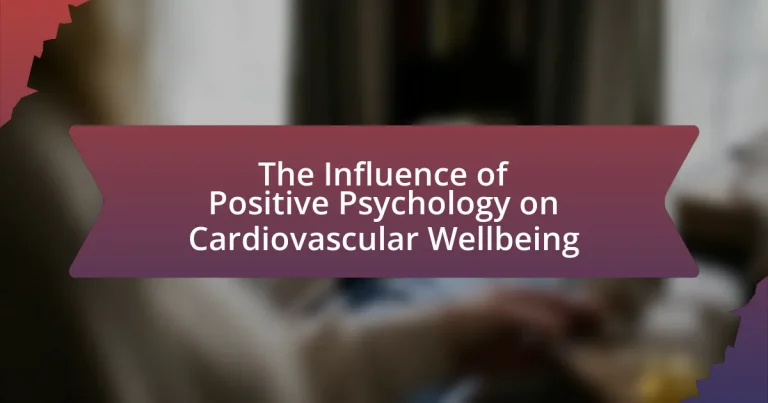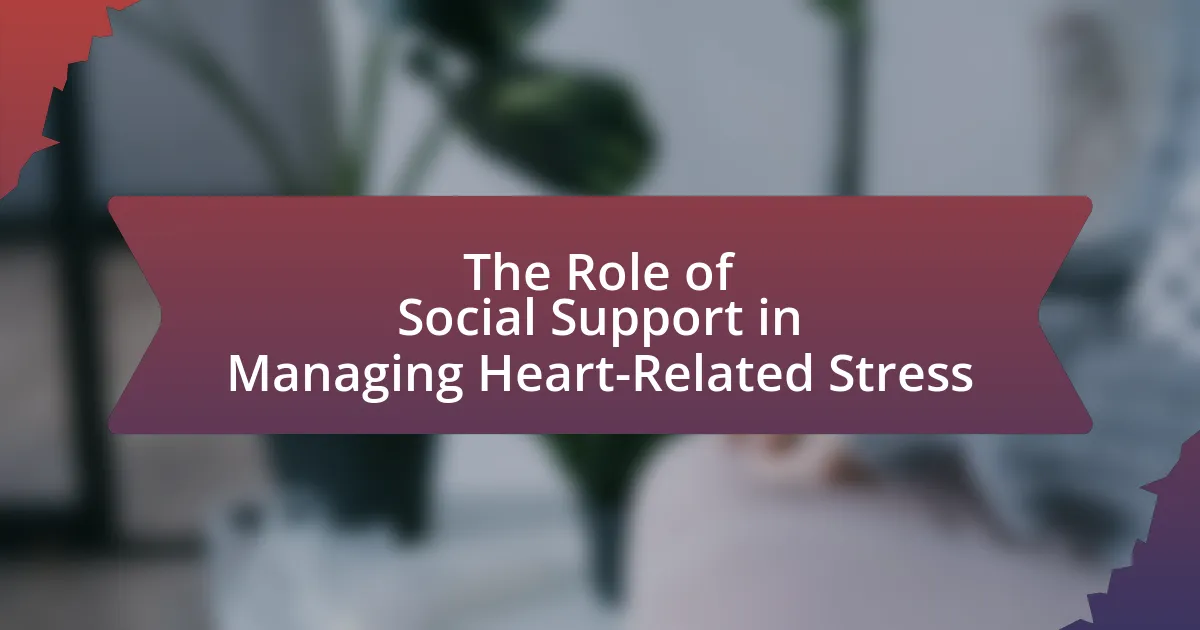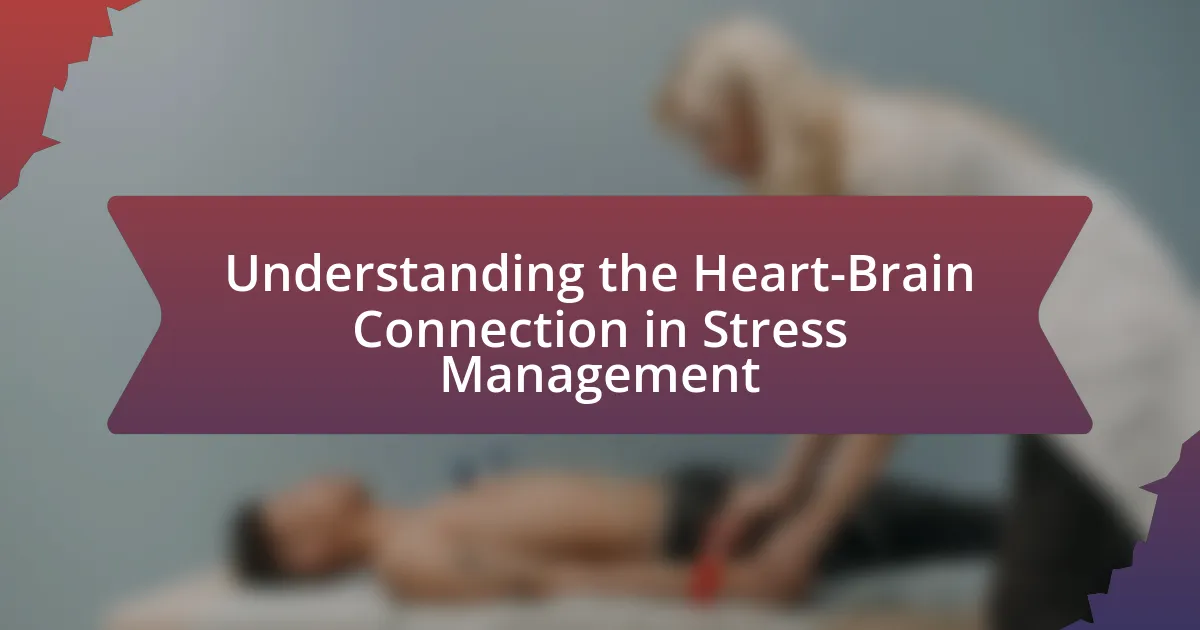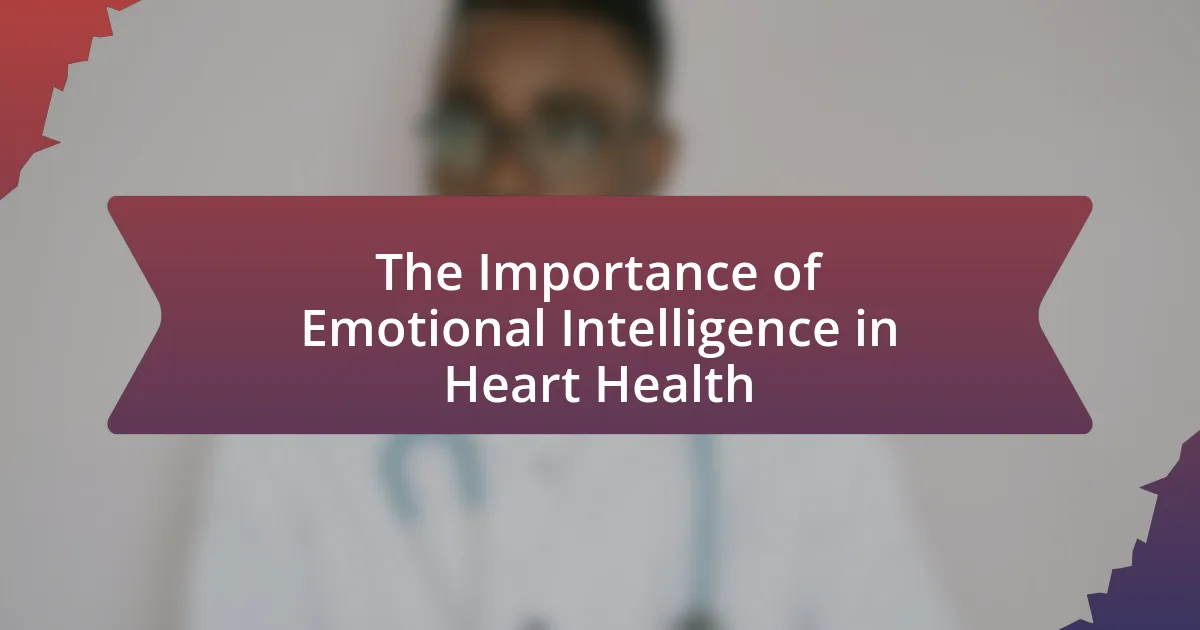The article examines the influence of positive psychology on cardiovascular wellbeing, highlighting how emotional resilience and stress reduction contribute to heart health. It discusses key principles of positive psychology, such as gratitude and mindfulness, and their association with lower blood pressure and reduced risk of heart disease. The article also explores the mechanisms through which positive emotions impact cardiovascular health, including stress reduction and improved lifestyle choices. Additionally, it emphasizes the importance of mental health in cardiovascular conditions and presents practical strategies for individuals to enhance their heart health through positive psychological practices.
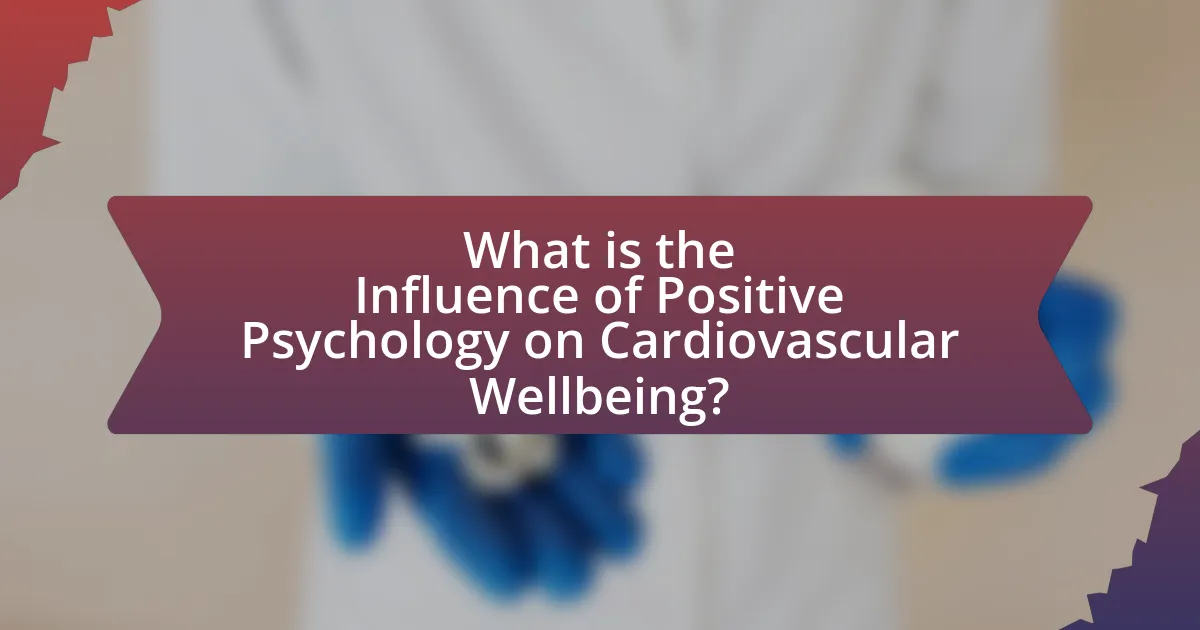
What is the Influence of Positive Psychology on Cardiovascular Wellbeing?
Positive psychology significantly influences cardiovascular wellbeing by promoting emotional resilience and reducing stress, which are critical factors in heart health. Research indicates that individuals who engage in positive psychological practices, such as gratitude and mindfulness, experience lower levels of cortisol, a stress hormone linked to cardiovascular issues. A study published in the Journal of Health Psychology found that participants who practiced gratitude showed improved heart rate variability, a marker of cardiovascular health. Additionally, positive emotions have been associated with lower blood pressure and reduced risk of heart disease, as evidenced by findings from the American Heart Association, which highlight the protective effects of optimism on cardiovascular outcomes.
How does positive psychology relate to cardiovascular health?
Positive psychology is linked to cardiovascular health through its promotion of well-being, which can lead to lower blood pressure and reduced risk of heart disease. Research indicates that individuals who engage in positive psychological practices, such as gratitude and optimism, experience lower levels of stress and inflammation, both of which are significant risk factors for cardiovascular issues. A study published in the Journal of the American College of Cardiology found that higher levels of positive affect were associated with a 22% lower risk of cardiovascular events. This evidence underscores the beneficial impact of positive psychology on heart health.
What are the key principles of positive psychology?
The key principles of positive psychology include the focus on strengths, the promotion of well-being, and the cultivation of positive emotions. Positive psychology emphasizes the importance of identifying and leveraging individual strengths to enhance personal growth and fulfillment. Research indicates that fostering well-being through positive experiences and relationships can lead to improved mental and physical health outcomes. Additionally, the cultivation of positive emotions, such as gratitude and optimism, has been shown to contribute to resilience and overall life satisfaction, which can positively impact cardiovascular health.
How do these principles impact cardiovascular wellbeing?
Positive psychology principles significantly enhance cardiovascular wellbeing by promoting emotional resilience, reducing stress, and fostering healthier lifestyle choices. Research indicates that individuals who engage in positive psychological practices, such as gratitude and mindfulness, experience lower levels of cortisol, a stress hormone linked to cardiovascular issues. For instance, a study published in the Journal of Health Psychology found that participants practicing gratitude showed improved heart health metrics, including lower blood pressure and reduced inflammation. These principles encourage proactive health behaviors, such as regular exercise and balanced nutrition, which are crucial for maintaining cardiovascular health.
Why is cardiovascular wellbeing important?
Cardiovascular wellbeing is important because it directly impacts overall health and longevity. A healthy cardiovascular system ensures efficient blood circulation, which is essential for delivering oxygen and nutrients to tissues while removing waste products. According to the World Health Organization, cardiovascular diseases are the leading cause of death globally, accounting for approximately 32% of all deaths in 2019. Maintaining cardiovascular wellbeing reduces the risk of heart disease, stroke, and other serious health issues, thereby enhancing quality of life and increasing lifespan.
What are the main factors affecting cardiovascular health?
The main factors affecting cardiovascular health include diet, physical activity, smoking, alcohol consumption, stress, and genetics. A balanced diet rich in fruits, vegetables, whole grains, and lean proteins can lower the risk of heart disease, while regular physical activity strengthens the heart and improves circulation. Smoking is a significant risk factor, as it damages blood vessels and reduces oxygen in the blood. Excessive alcohol consumption can lead to high blood pressure and heart failure. Chronic stress has been linked to increased heart disease risk due to its effects on blood pressure and inflammation. Additionally, genetic predisposition plays a crucial role, as family history can influence an individual’s likelihood of developing cardiovascular conditions.
How does mental health influence cardiovascular conditions?
Mental health significantly influences cardiovascular conditions by affecting physiological responses and behaviors that contribute to heart health. Individuals with poor mental health, such as depression or anxiety, often exhibit increased levels of stress hormones like cortisol, which can lead to elevated blood pressure and heart rate, ultimately increasing the risk of cardiovascular diseases. Research indicates that individuals with depression have a 64% higher risk of developing coronary artery disease, highlighting the direct correlation between mental health and cardiovascular outcomes. Furthermore, mental health issues can lead to unhealthy lifestyle choices, such as poor diet, lack of exercise, and smoking, which further exacerbate cardiovascular risks.
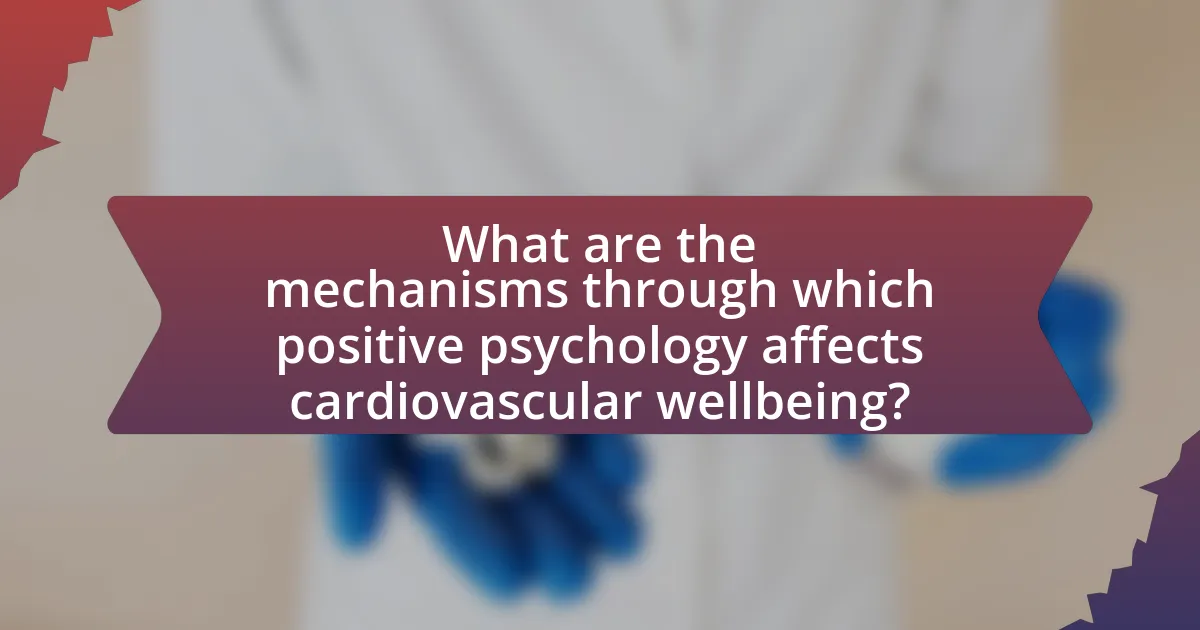
What are the mechanisms through which positive psychology affects cardiovascular wellbeing?
Positive psychology affects cardiovascular wellbeing primarily through mechanisms such as stress reduction, enhanced emotional regulation, and improved social connections. Stress reduction occurs as positive emotions can lower cortisol levels, which are linked to cardiovascular issues; studies show that individuals with higher levels of positive affect experience lower blood pressure and heart rate variability. Enhanced emotional regulation allows individuals to cope better with challenges, leading to healthier lifestyle choices, such as increased physical activity and better dietary habits, which are crucial for heart health. Improved social connections fostered by positive psychology contribute to a supportive environment, reducing feelings of isolation and promoting behaviors that benefit cardiovascular health, as evidenced by research indicating that strong social ties correlate with lower rates of heart disease.
How do positive emotions contribute to heart health?
Positive emotions contribute to heart health by reducing stress and promoting healthier lifestyle choices. Research indicates that individuals who experience frequent positive emotions have lower levels of cortisol, a stress hormone linked to heart disease. A study published in the Journal of the American College of Cardiology found that positive emotional states are associated with lower blood pressure and improved heart rate variability, both of which are indicators of cardiovascular health. Additionally, people with positive emotions are more likely to engage in physical activity and maintain a balanced diet, further supporting heart health.
What role does stress reduction play in cardiovascular wellbeing?
Stress reduction plays a crucial role in cardiovascular wellbeing by lowering blood pressure and reducing the risk of heart disease. Chronic stress is linked to increased levels of cortisol, which can lead to inflammation and arterial damage. Studies indicate that stress management techniques, such as mindfulness and relaxation exercises, can significantly improve heart health. For instance, a meta-analysis published in the Journal of the American College of Cardiology found that patients who engaged in stress reduction interventions experienced a 30% reduction in cardiovascular events. This evidence underscores the importance of stress reduction in maintaining and enhancing cardiovascular health.
How does optimism influence heart disease outcomes?
Optimism positively influences heart disease outcomes by promoting healthier lifestyle choices and reducing stress levels. Research indicates that individuals with a positive outlook are more likely to engage in regular physical activity, maintain a balanced diet, and adhere to medical advice, which collectively contribute to better cardiovascular health. A study published in the Journal of the American College of Cardiology found that optimistic individuals had a 50% lower risk of heart disease compared to their pessimistic counterparts, highlighting the significant impact of a positive mindset on heart health.
What practices in positive psychology can enhance cardiovascular health?
Practices in positive psychology that can enhance cardiovascular health include gratitude exercises, mindfulness meditation, and fostering social connections. Gratitude exercises, such as keeping a gratitude journal, have been shown to reduce stress and improve overall well-being, which can lower blood pressure and improve heart health. Mindfulness meditation helps in reducing anxiety and stress, leading to better cardiovascular outcomes; studies indicate that regular mindfulness practice can decrease heart rate and blood pressure. Additionally, fostering social connections through supportive relationships has been linked to lower risks of heart disease, as social support can buffer against stress and promote healthier lifestyle choices.
What are effective positive psychology interventions for heart health?
Effective positive psychology interventions for heart health include gratitude practices, mindfulness meditation, and fostering social connections. Research indicates that gratitude practices can enhance emotional well-being and reduce stress, which are crucial for cardiovascular health. A study published in the Journal of Psychosomatic Research found that individuals who regularly practiced gratitude reported lower blood pressure and improved heart health metrics. Mindfulness meditation has been shown to decrease anxiety and improve emotional regulation, contributing to lower heart rate and blood pressure. Additionally, fostering social connections through community engagement and supportive relationships has been linked to reduced cardiovascular risk, as social support can mitigate stress and promote healthier lifestyle choices.
How can mindfulness and gratitude improve cardiovascular wellbeing?
Mindfulness and gratitude can significantly improve cardiovascular wellbeing by reducing stress and promoting healthier lifestyle choices. Research indicates that mindfulness practices lower blood pressure and heart rate by enhancing emotional regulation and decreasing anxiety levels. A study published in the Journal of the American College of Cardiology found that individuals who practiced mindfulness meditation experienced a 30% reduction in cardiovascular events compared to those who did not. Additionally, gratitude has been linked to improved heart health; individuals who regularly express gratitude report better sleep quality and lower levels of inflammation, both of which are crucial for cardiovascular health. Thus, incorporating mindfulness and gratitude into daily routines can lead to measurable improvements in cardiovascular wellbeing.
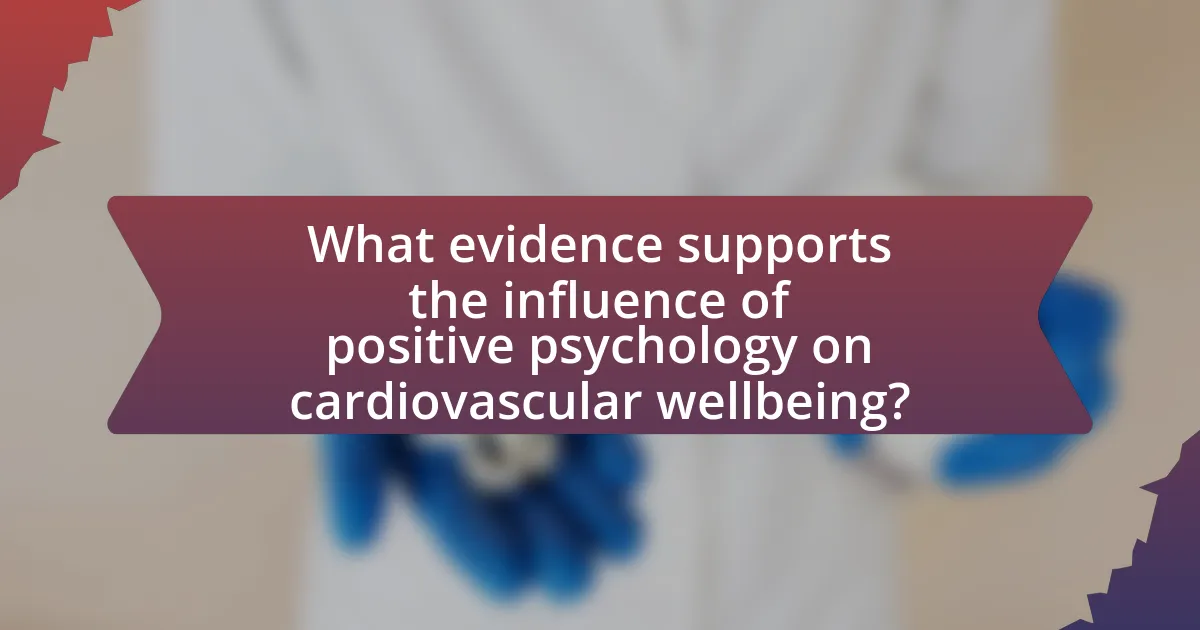
What evidence supports the influence of positive psychology on cardiovascular wellbeing?
Positive psychology significantly influences cardiovascular wellbeing, as evidenced by various studies linking positive emotional states to improved heart health. Research published in the journal “Circulation” by Pressman and Cohen (2005) found that individuals with higher levels of positive affect exhibited lower rates of cardiovascular disease and better overall heart function. Additionally, a meta-analysis in “Health Psychology” by Chida and Steptoe (2008) demonstrated that optimism and life satisfaction correlate with reduced risk of heart disease and lower mortality rates. These findings collectively support the assertion that positive psychological factors contribute to enhanced cardiovascular health.
What research studies highlight this relationship?
Research studies that highlight the relationship between positive psychology and cardiovascular wellbeing include a study by Pressman and Cohen (2005), published in the journal “Psychological Bulletin,” which found that positive emotional states can lead to lower cardiovascular disease risk. Additionally, a meta-analysis by Chida and Steptoe (2008) in “Health Psychology” demonstrated that higher levels of positive affect are associated with reduced risk of coronary heart disease. These studies provide concrete evidence that positive psychological factors can significantly influence cardiovascular health outcomes.
What findings demonstrate the impact of positive psychology on heart health?
Positive psychology significantly impacts heart health by promoting emotional well-being, which is linked to lower cardiovascular disease risk. Research indicates that individuals with higher levels of positive emotions, such as joy and gratitude, exhibit better heart health outcomes, including lower blood pressure and reduced inflammation. A study published in the journal “Circulation” by researchers at the University of North Carolina found that individuals with a positive outlook had a 50% lower risk of heart disease compared to those with negative emotions. Additionally, a meta-analysis in “Health Psychology” revealed that positive psychological traits correlate with healthier lifestyle choices, such as regular exercise and balanced diets, further enhancing cardiovascular health.
How do longitudinal studies contribute to our understanding?
Longitudinal studies contribute to our understanding by tracking changes in individuals over time, allowing researchers to observe the long-term effects of positive psychology on cardiovascular wellbeing. These studies provide valuable data on how sustained positive psychological traits, such as optimism and resilience, influence heart health metrics, including blood pressure and cholesterol levels. For instance, research published in the Journal of the American College of Cardiology found that individuals with higher levels of optimism had a significantly lower risk of cardiovascular events over a 10-year period, demonstrating the direct impact of psychological factors on physical health outcomes.
What are the implications of positive psychology for cardiovascular health interventions?
Positive psychology significantly enhances cardiovascular health interventions by promoting mental well-being, which is linked to improved heart health outcomes. Research indicates that positive emotions and psychological resilience can lower stress levels, reduce inflammation, and improve overall cardiovascular function. For instance, a study published in the Journal of the American College of Cardiology found that individuals with higher levels of optimism had a 50% lower risk of heart disease compared to their pessimistic counterparts. This evidence underscores the importance of integrating positive psychology principles, such as gratitude and mindfulness, into cardiovascular health programs to foster better patient engagement and adherence to lifestyle changes.
How can healthcare providers incorporate positive psychology into treatment plans?
Healthcare providers can incorporate positive psychology into treatment plans by integrating techniques that enhance patients’ strengths, foster resilience, and promote well-being. This can be achieved through practices such as gratitude exercises, mindfulness training, and strengths-based assessments, which have been shown to improve mental health outcomes and overall quality of life. Research indicates that positive psychology interventions can lead to significant reductions in anxiety and depression, which are critical factors in cardiovascular health. For instance, a study published in the Journal of Positive Psychology found that participants who engaged in positive psychology exercises reported improved emotional well-being and lower stress levels, contributing to better cardiovascular outcomes.
What role do community programs play in promoting cardiovascular wellbeing through positive psychology?
Community programs play a crucial role in promoting cardiovascular wellbeing through positive psychology by fostering social connections and enhancing individual resilience. These programs often incorporate activities that encourage physical exercise, stress reduction, and community engagement, which are essential for heart health. Research indicates that social support and positive emotional experiences can lower blood pressure and improve overall cardiovascular health. For instance, a study published in the Journal of Health Psychology found that participants in community-based wellness programs reported significant improvements in mental health and cardiovascular risk factors, demonstrating the effectiveness of such initiatives in leveraging positive psychology for better heart health outcomes.
What practical strategies can individuals adopt to enhance cardiovascular wellbeing through positive psychology?
Individuals can enhance cardiovascular wellbeing through positive psychology by adopting strategies such as practicing gratitude, engaging in mindfulness, and fostering social connections. Practicing gratitude has been shown to reduce stress and improve heart health, as evidenced by a study published in the Journal of Psychosomatic Research, which found that individuals who regularly express gratitude experience lower blood pressure and improved cardiovascular function. Engaging in mindfulness practices, such as meditation and deep breathing, can lower heart rate and reduce anxiety, contributing to better cardiovascular health, as supported by research from the American Heart Association. Additionally, fostering strong social connections has been linked to lower rates of heart disease, with studies indicating that individuals with robust social networks have a 50% increased likelihood of survival compared to those who are socially isolated. These strategies collectively promote a positive mindset, which is crucial for maintaining cardiovascular health.
How can daily practices of gratitude and optimism be implemented?
Daily practices of gratitude and optimism can be implemented through structured activities such as journaling, meditation, and intentional reflection. Individuals can maintain a gratitude journal where they write down three things they are thankful for each day, which has been shown to enhance overall well-being and reduce stress levels. Research by Emmons and McCullough (2003) in the Journal of Personality and Social Psychology found that participants who engaged in gratitude journaling reported higher levels of positive affect and life satisfaction. Additionally, practicing optimism can involve setting positive intentions for the day and reframing negative thoughts into positive ones, which can lead to improved mental health outcomes. Regularly engaging in these practices fosters a mindset that contributes to cardiovascular well-being by reducing stress and promoting healthier lifestyle choices.
What are some tips for integrating positive psychology into a heart-healthy lifestyle?
Integrating positive psychology into a heart-healthy lifestyle involves cultivating gratitude, fostering social connections, and practicing mindfulness. Research indicates that gratitude can enhance emotional well-being and reduce stress, which is beneficial for heart health; a study published in the Journal of Psychosomatic Research found that individuals who regularly practiced gratitude reported lower blood pressure and improved heart function. Additionally, maintaining strong social connections has been linked to lower cardiovascular risk, as social support can mitigate stress and promote healthier behaviors. Mindfulness practices, such as meditation and deep breathing, have been shown to lower heart rate and blood pressure, contributing to overall cardiovascular health.
